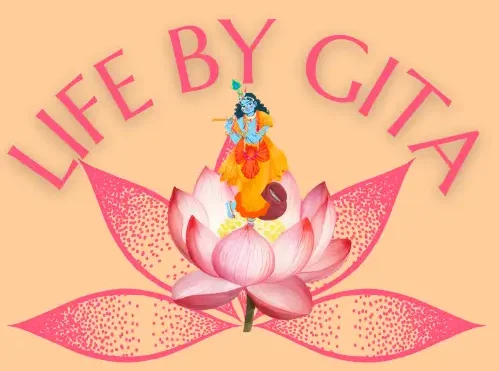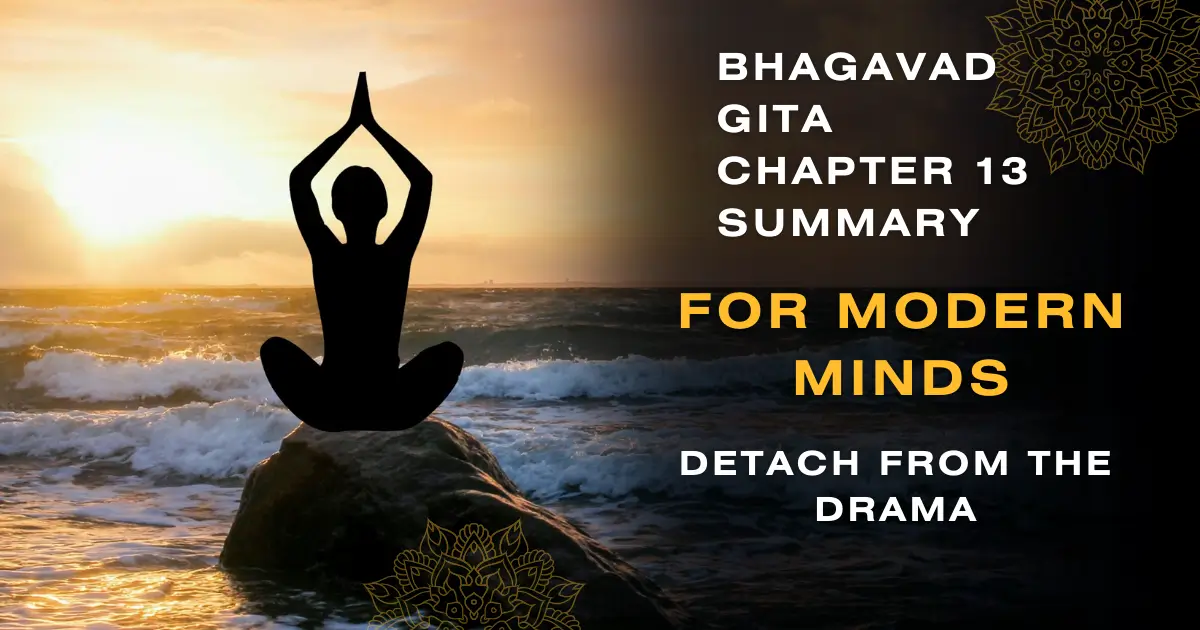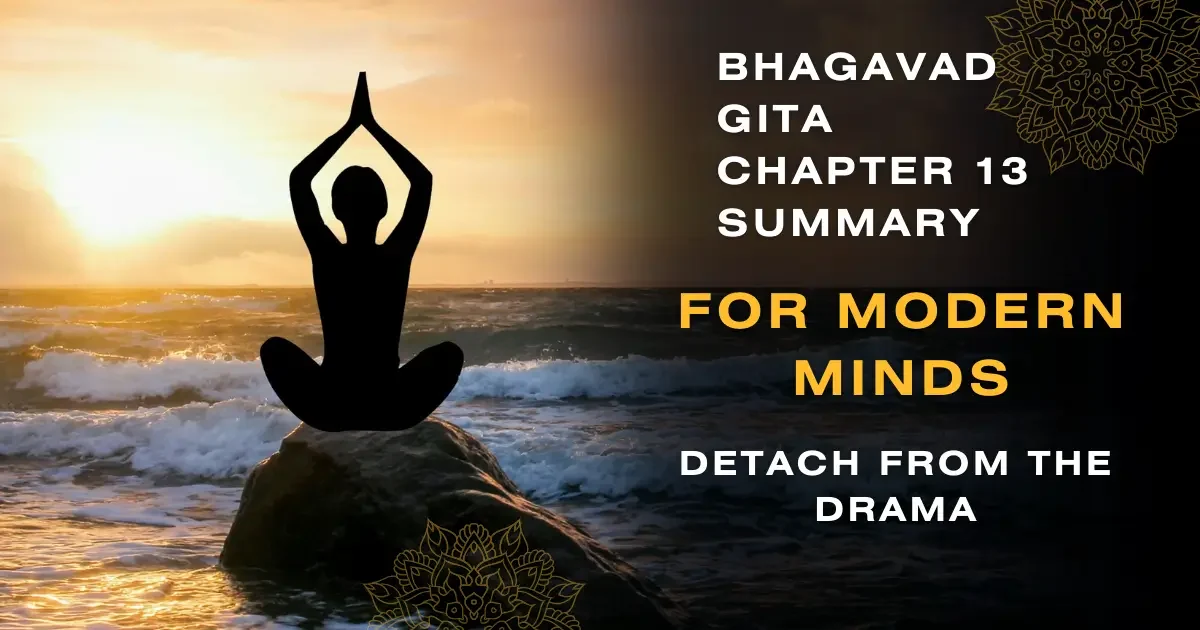
Welcome everyone, we’re back on our Bhagavad Gita journey! Today, we are going to discuss the Summary of Bhagavad Gita Chapter 13. If you haven’t already, check out our breakdown of Chapter 12, where Krishna revealed Arjuna the importance of Devotion and surrender to the Divine.
1. Introduction
In Chapter 13, titled “The Yoga of Distinguishing the Field and the Knower of the Field,” things get even more mind-blowing. Here, Krishna reveals a profound secret – the key to unlocking your true, eternal Self and breaking free from the constant drama of life.
Imagine life as a grand play. We’re all actors on a temporary stage, but sometimes we get so engrossed in our roles that we forget the director (the divine) and the purpose of the performance. Chapter 13 helps us step back, understand the play’s mechanics, and remember who we truly are. So, are you ready? Things are about to get beautifully philosophical!
2. Bhagavad Gita Chapter 13 Summary: The Field and the Knower of the Field
Krishna introduces two key concepts: Kshetra (the field) and Kshetrajna (the knower of the field). The Field is our physical body, mind, and intellect – the ever-changing realm of experience. The Knower of the Field, on the other hand, is the unchanging, immortal soul – the true “you” that witnesses all these experiences. Above these two, there is the Divine Self which is present in every living being and the whole existence, the Supreme Soul. The Soul is individual but the Supreme Soul is the Universal Divine from where all the souls come from and ultimately merge also.
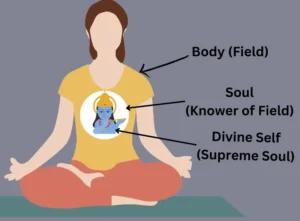
Here’s a powerful verse (Chapter 13, Verse 35):
Easy Translation: Knowing the field (body), the knower of the field (soul), the knowledge (instrument of knowing), and the witness (the divine Self) – knowing all these, one becomes free.
This verse reminds us that we’re not just our bodies or minds. We are the conscious spark observing everything through these temporary lenses. Just like an actor doesn’t get attached to their costume, we shouldn’t get attached to the temporary stage of life.
3. The Path to Liberation: Modern Relevance
By recognizing the distinction between the Kshetra and the Kshetrajna, we gain immense freedom. We stop identifying with our fleeting emotions, thoughts, and actions. We become the detached observer, the witness, and ultimately, the master of our experience.
Chapter 13 beautifully guides us on the path of liberation (Moksha). It emphasizes the importance of:
- Discernment (Viveka): Learning to differentiate between the real (soul) and the unreal (body and mind).
- Equanimity (Samatva): Maintaining emotional balance in success and failure.
- Surrender (Sharanagati): Releasing our ego and trusting in the divine.
These principles are as relevant today as ever. In a world obsessed with external validation and fleeting pleasures, Chapter 13 offers a timeless roadmap to inner peace and lasting joy.
We can apply its teachings to our modern life when we are feeling very depressed or can’t find any solution.
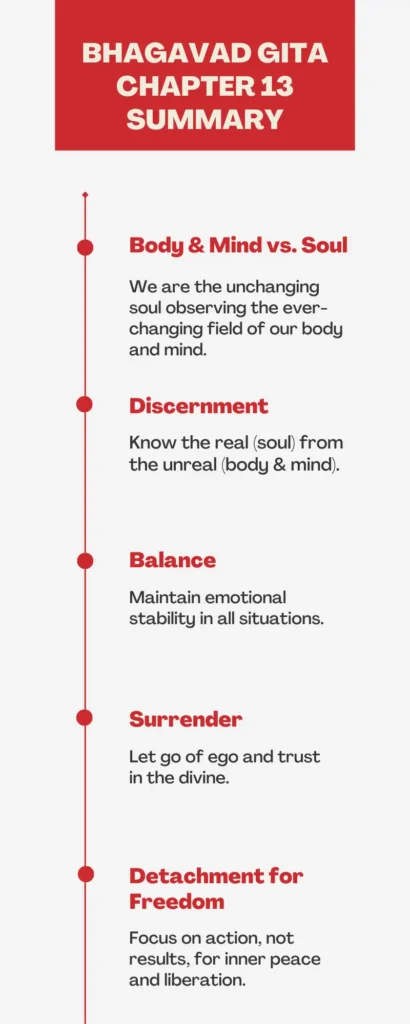
4. Conclusion: Stepping Off the Stage and Finding Your Director Within
By recognizing the distinction between the ever-changing field (body and mind) and the unchanging knower of the field (the soul), we gain immense freedom. We become the detached observer, no longer swept away by fleeting emotions and desires. Chapter 13 beautifully guides us on the path to liberation (Moksha) through cultivating discernment, equanimity, and surrender. These principles offer a timeless roadmap to inner peace and lasting joy in a world obsessed with external validation and fleeting pleasures. Integrate the wisdom of Chapter 13, and you might just step off the stage of life’s drama and discover the eternal director within – the source of peace, power, and purpose.
If you have any comment or feedback, feel free to leave in the comment section at the bottom.
Must Read: Problems in everyday life that need to be solved by Bhagavad Gita
If you want to read the above summary offline, then you can download its pdf version below:
Bhagavad Gita Chapter 13 Summary pdf
5. FAQs
Q: But how do I detach from my emotions and desires?
A: Detachment doesn’t mean becoming emotionless. It means acknowledging your emotions without getting swept away by them. Practice mindfulness and meditation to become a calm observer of your thoughts and feelings.
Q: This all sounds good, but isn’t inaction problematic?
A: Performing your duty (karma) is key. However, Chapter 13 encourages action without attachment to the outcome. Do your best, but let go of the need to control the results. This frees you from stress and allows you to enjoy the journey.
Q: I find it hard to believe in a divine force.
A: The “divine” in Chapter 13 can be understood as the universal consciousness or the interconnectedness of all things. Focus on the wisdom and practical applications of the chapter, regardless of your personal beliefs.
Further Reading Bhakti Marga
